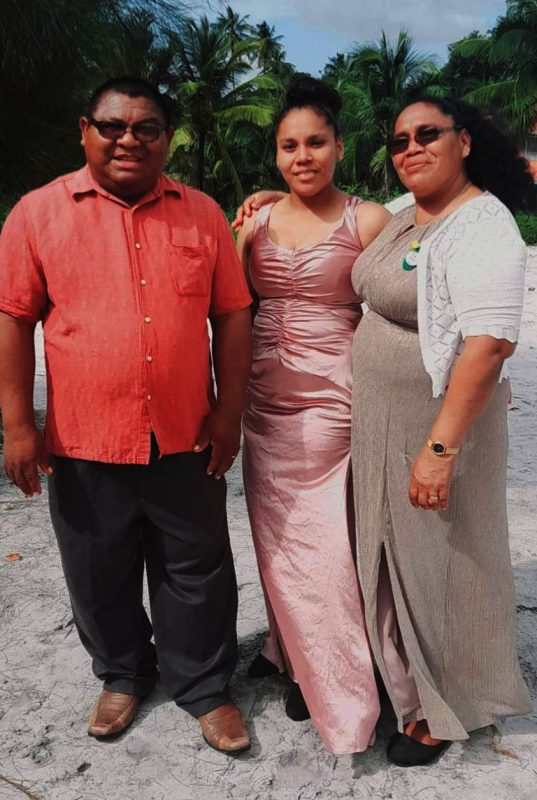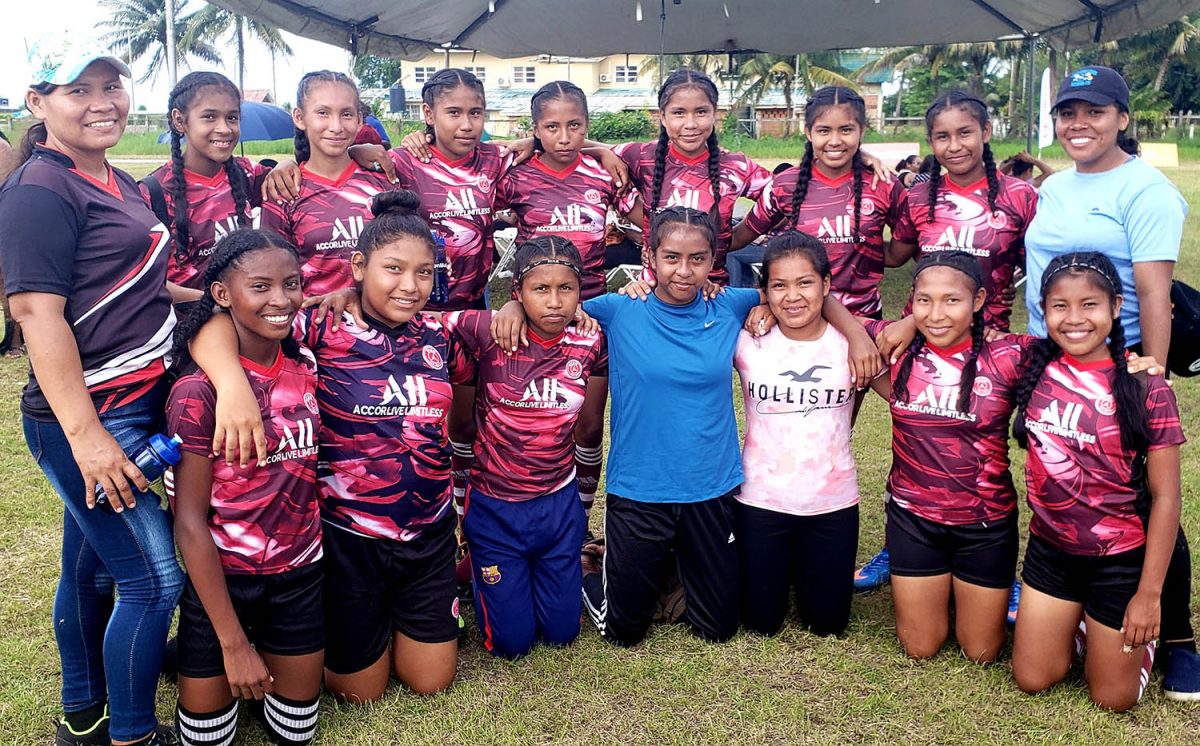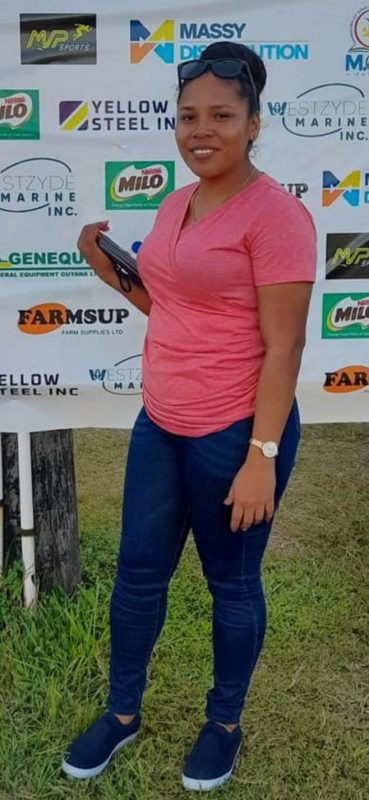Self-taught football coach Monique Emmanuel, who recovered from a serious childhood injury and was warned against physical exertion, nevertheless spends most of her time volunteering and being involved in outdoor sports.
The 26-year-old environmental assistant attached to the Waramuri Health Centre in Moruca, Region One (Barima/Waini) coaches the village’s under-14 girls football team as well as assists with the boys team.
Also a community activist, she is the youth and women’s representative for Waramuri on the Moruca District Council and has attended workshops to better understand her role. “I love helping wherever I can in my community, especially when it comes to young people and women in order to promote a better life for them,” she told Stabroek Weekend in a recent interview. “I volunteered my services to coach football at the school level. I get support from the community, especially from parents who tell me to keep up the good work. I will continue to work in my community, support and help wherever and whenever I can.”
Born at Waramuri Mission, Emmanuel, the youngest of three children, is the daughter of former toshao Learmond Emmanuel and Vanessa Emmanuel, nurse/midwife stationed at the Waramuri Health Centre. Her grandmother, Vera Boyal, was the community’s first nurse/midwife.
When she was five years old, Emmanuel fell to the ground from a building and fractured her skull. The doctors cautioned her parents about her being unable to take part in sports, other physical activities and playing in the sun.
“I think that led me to find my strength. Throughout my school life I took part in athletics and from then onwards I started playing outdoor sports, in particular, volleyball and football,” she said. “Football was the one that really pushed me to find my strength and to do something I love. Football is part of what I am at present.”
Emmanuel attended Waramuri Nursery and Waramuri Primary and had her secondary education at Santa Rosa Secondary School, where she and her sister lived in the girls’ dormitory for a short period. In 2008/2009 when some of the girls became sick with a mystery illness, their parents moved them to a host family in Santa Rosa village where they stayed until they completed their secondary education.
Safety and security were always major issues at the dorms, Emmanuel said, adding that she was alarmed at the fire that claimed the lives of 20 children at Mahdia and the fact that certain fire safety mechanisms were not in place there and in other dorms in hinterland communities.
Dorm living has its own problems, she said, but it could be made worth the stay if programmes or activities are put in place to make life less boring for students who must be away from home for an entire school term or school year. “Sometimes I wanted to come home and I couldn’t,” she recalled. Sometimes I wanted some things and couldn’t get them. During that time cell phones were not that popular. A few students had…”
She noted the need for counsellors to engage students regularly and for house mothers and house fathers to be well trained in dealing with students. “It is not enough for them to just be kind and loving. They need other attributes. During my time we exercised, did morning runs, had fire drills under a well-guided dorm mother,” she said.
The fire at Mahdia, she said, has brought to the fore the need to bridge the developmental gap between the coastland and the hinterland. “Government needs to empower hinterland leaders to take charge of hinterland development through hands-on training and provide the necessary funding to village councils to get things done. There is a lot of talk but not much action,” she noted.
Football
When Emmanuel started playing football at Waramuri it was not a popular sport among girls. “We were just about two or three girls who played with the boys in the afternoon after school for relaxation. Here at Waramuri, people play football and volleyball every afternoon and sometimes cricket,” she added.
Because she trained with the boys when they were preparing for competitions, Emmanuel fell in love with the sport. In 2010, when she was about 13 years old, the Silver Sands Sports Club at Waramuri took part in football competitions with other communities.
“From then on football became part of me, and for the girls here too. The boys looked out for us in the game. They told us what to do and what not to do. They warned us about tackles and playing rough. They never tried to push us away. That was how we started developing female footballers in Waramuri also,” she said.
Her admiration for her community, she said, is rooted in the respect the people showed them for their efforts. “When we first started playing, the boys showed us respect and the community respected us girls for taking part in the sport,” she added.
Annalisa Vincent of Waramuri is a national women’s footballer and currently the first Guyanese indigenous student on a football scholarship at Graceland University in the United States. She grew up playing football with Emmanuel in the Silver Sands Sports Club, where Emmanuel has served as vice president and president.
The Waramuri Primary Top girls football team which Emmanuel is coaching is making headlines in the ExxonMobil under-14 Football tournament now underway in Georgetown. In the round of 16, Emmanuel’s team has defeated every team it has played to date: scoring 13-nil against Vergenoegen Secondary; 8-nil against St Stanislaus College and 13-nil against New Campbellville Secondary. Now into the quarter finals, the team was set to face off with Ann’s Grove Secondary this weekend and possibly go to the next round. Their male counterparts are also in the quarter finals.
Initially the girls were training with the boys when Emmanuel approached the teachers in charge of them indicating her willingness to assist in coaching the girls. “I said once I am available and it has to do with sports and youth development I am in for it,” she said. Later on asked if she could also assist the boys.
“When they gave me the opportunity to assist, I took it immediately,” she said. “I often tell the girls, in my time, I didn’t get the opportunity at the national level but once they are given the opportunity to excel and prove that the hinterland has talent and has what it takes to make it out there, they can emulate Annalisa Vincent. I tell them they can start by representing Waramuri; to play because they love it and because it is their passion. So when the school was given the chance in this ExxonMobil tournament, we saw an opportunity to show our skills and talent. The girls follow the sport and we work on their passion for the game. I work on the technical aspects among other things. I pass on what I learned from playing in numerous competitions and tournaments.”
In general Waramuri female footballers have dominated in the Moruca district. Every year for several years, Emmanuel played on the Barima/Waini Female Football team at the Amerindian Heritage Games in Georgetown and in the Atkinson’s Five A-Side Tournament in Moruca. “With the exception of one year when we lost, we have been the defending champions of the five-a-side tournament all the years since the inception of those games over a decade ago. Right now we are the title holders,” she noted.
Emmanuel was also a member of the Moruca All Stars Female Football team and while she has played for Moruca and Region One, she has never played nationally.
Asked if she has done any training in coaching, Emmanuel said, “I was never part of any training for coaching before. The knowledge I gained while playing football is what I try to pass on and I build on that. I stress discipline, technique and enjoyment of the game. I also do a lot of talking and mentoring with the boys and girls to get them mentally prepared.”
She noted that some of Waramuri Primary Top players are not from Waramuri Mission proper but from the neighbouring communities of Haimaracabra and Para. To accommodate them, they train in the afternoons before the boat that transports students leaves at 3 pm for Haimaracabra.
“It’s not like they gather to kick ball in the afternoons. We try to get as much done within an hour before the boats leave after school is dismissed,” she stressed.
“My mother is also a lover of sports so she helped me as well. When we go to Georgetown, only the teachers and coaches are with the team. Whenever players experience pain, they come to me and talk about it. I try a bit of massaging to correct their issue. I learnt a thing or two from my father, mother and grandmother.”
Environmental health
In her paid job, Emmanuel said, “I visit homes, shops, business places to ensure certain standards of sanitation are maintained or need upgrading. Visiting outlying areas is a problem due to the lack of transportation. Transportation is an issue. The authorities are working on that. We team up with the nurses, community health workers and CSOs [community service officers] in outreaches.”
The issue of waste disposal is not much of a problem but she faces challenges with littering. “We are working on that with the help of the CSOs. We do regular walkabout and clean up campaigns,” she said.
She has been successful in getting businesses, including small shops, to install garbage receptacles.
Apart from her involvement with the Silver Sands Sports Club, Emmanuel is the chairperson of the Waramuri Women Investors Group which is at present involved in the rearing of chicken. As the youth representative on the Moruca District Council she was involved in a women’s financial workshop sponsored by ExxonMobil with other women from Haimaracabra and Para.
“As part of this workshop we had to come up with business ideas. We targeted different categories of women. We started with 20 women. We involved single parents and women without jobs. We called it an investors group because other business ideas have come up and we want to see how we can help our members either as individuals or as a group. The teachers in the group are busy, I’m busy with my work too,” she said.
When the Hinterland Environmentally Sustainable Agricultural Development (HESAD) project under the Ministry of Agriculture came on board, the women’s group submitted a project proposal to rear meat birds. It was approved and they were granted some funding. They have since reared and sold several batches of chicken. Some women ventured into new businesses. Some young people went out of the community to become trained in careers and the group has gained new members.
“During Covid-19 when we could not get meat from Charity or the Essequibo Coast we tried our best to meet the demands in the village and that kept us going. The cost of feed was a challenge but we survived. The women are very committed. I was involved in other activities and the women continued to rear the birds and work towards our group’s goals,” Emmanuel said.
When the women are not busy in the poultry project, some, especially the younger women, do catering or other business activities to secure an income for their families. Because they work with a limited budget, she said, sometimes the menfolk assist by volunteering or being partly paid for their labour. And while the group began voluntarily, they are now looking towards sharing in some dividends.
When people ask her about Waramuri, she tells them, it is not a mining area and full of mineral wealth.
“You come to my village. You will see the development. People don’t want to stay at one level. They keep on moving. I tell the young ones we have the opportunity at home. Secondary education is now available at home. It wasn’t there in my time. Our teachers are from our home,” she stressed.
“Whenever we have the opportunity for exposure we take it. I was privileged, during my school time, to travel out of my community. With Waramuri Primary top now offering 14 subjects at the Caribbean Secondary Education Certificate, I encourage children to attend school regularly. Even though some students write the National Grade Six Assessment and get opportunities to go to other schools out of the community, parents keep their children at home because they have confidence in Waramuri Primary Top.”
Going forward, she said, “I don’t know what the future holds for me. I’m humble enough to see wherever it takes me. For now, I will continue to do what I love, volunteer as far as possible. My objective is to go to the University of Guyana, but with funding being an issue, a scholarship would be nice.”













